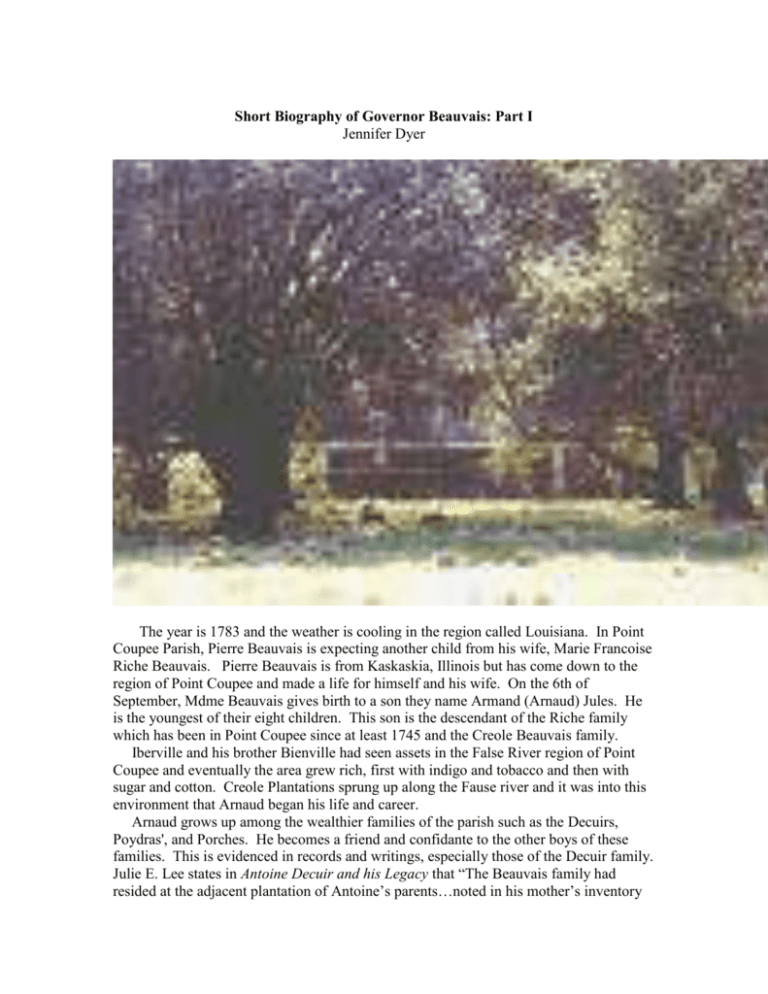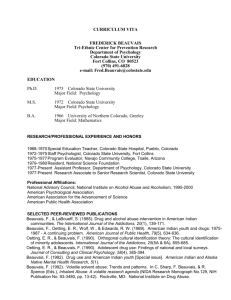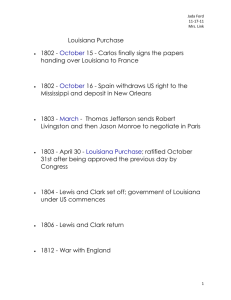Biography - Partial - by Graduate History
advertisement

Short Biography of Governor Beauvais: Part I Jennifer Dyer The year is 1783 and the weather is cooling in the region called Louisiana. In Point Coupee Parish, Pierre Beauvais is expecting another child from his wife, Marie Francoise Riche Beauvais. Pierre Beauvais is from Kaskaskia, Illinois but has come down to the region of Point Coupee and made a life for himself and his wife. On the 6th of September, Mdme Beauvais gives birth to a son they name Armand (Arnaud) Jules. He is the youngest of their eight children. This son is the descendant of the Riche family which has been in Point Coupee since at least 1745 and the Creole Beauvais family. Iberville and his brother Bienville had seen assets in the False River region of Point Coupee and eventually the area grew rich, first with indigo and tobacco and then with sugar and cotton. Creole Plantations sprung up along the Fause river and it was into this environment that Arnaud began his life and career. Arnaud grows up among the wealthier families of the parish such as the Decuirs, Poydras', and Porches. He becomes a friend and confidante to the other boys of these families. This is evidenced in records and writings, especially those of the Decuir family. Julie E. Lee states in Antoine Decuir and his Legacy that “The Beauvais family had resided at the adjacent plantation of Antoine’s parents…noted in his mother’s inventory of 1779.”(p 32) Presumably, Beauvais continued to reside near there as an adult. A. Beauvais is recorded to have resided in Point Coupee in the 1804 Early Louisiana Census (Petitioner’s list) and he a buys a plantation from his mother (11 arpents on the Mississippi River) in 1806. Just four years later in 1810, census records indicate that he resided in Point Coupee Parish, La as Head of Household with two other females, presumably family members. It is in this year that Governor W.C.C. Claiborne names him Justice of the Peace of Point Coupee parish in addition to him being president of the Church Wardens of St. Francis Church. He was just 27 years old. It is important to note at this point that in addition to Beauvais’ accomplishments as a politician, he began his career as “planter” and probably continued to do so throughout his lifetime. Many planters hired others (and expected their wives) to handle their business affairs at home if they had to be away on business on a regular basis. A year later, in 1811, Arnaud Beauvais married Louise Delphine Labatut. Louise was a native of New Orleans and her background is rather unclear. It is assumed that she was one of the seven children of Jean Baptiste Labatut and Marie Felicite St. Martin. Labatut was distinguished as Attorney General (named by the Cabildo) and at the time of his daughter Louise’s marriage, he was the Director of the Bank of Louisiana (He is buried in St. Louis No. 2 in New Orleans). It is natural that Arnaud would decide to marry someone of Louise’s background. Most planters who owned plantations along the river also owned town homes in New Orleans. This would probably account for the connection of Beauvais to the Labatut’s. It is not unreasonable to assume that he participated in social and political events in New Orleans and spent a decent amount of time there, even though his primary residence was in Point Coupee. Therefore, he would have connections with respectable, wealthy families in the city as well as in his own parish. Around this same time, Arnaud’s sister, Louise Beauvais is married to her first husband who is according to Lee “an immigrant from Haiti by the name of Charles Pierre Tanneret”(32). This is significant to Arnaud in that, his sister was shortly thereafter widowed and gave power of attorney over her affairs to him in 1815.(Lee, 32) This would not be the last time that Arnaud is asked to handle the affairs of others which indicates that he was most probably a dependable and trustworthy gentleman in most people’s opinion. In 1814, Arnaud was elected to the Louisiana House of Representatives and held his seat until 1820, having been elected again in 1816 and 1820. He served as Speaker of the House beginning in 1821. Census records indicate that in 1820, Armand Beauvais still resided in Point Coupee Parish while he performed his duties in the government. Around 1822-23 several events occur that add to Armand’s reputations and obligations. Personally, his childhood friend, Joseph Decuir is ill; fears he is dying and has no heirs in 1821. Decuir names Beauvais and several other men as his heirs and in particular named “Mr. Vincent Porche and Arnaud Beauvais, ‘both my friends,’ his executors”. (Lee, 27) This event is another indicator that Armand Beauvais was a trustworthy fellow. Specifically exemplified in the fact that Decuir consults with Porche and Beauvais and “gives them instructions regarding his estate..”(Lee, 27) In addition, Beauvais served as a confidante and friend to Joseph Decuir’s brother, Antoine, who was wealthy and prospering. Here we see a snapshot of the life that Armand Beauvais led. Some of his friends included, Sr. Destrehan, Sr. Duplessis, Sr. Sauve, Sr. Porche and Sr. Poydras who, as Lee points out in Antoine Decuir and his Legacy, “comprised a group of prominent planters, influential merchants and politicians.”(28) Furthermore, Armand’s widowed sister, Louise enters into a contract to marry Antoine Decuir in 1823 thereby linking the two families by marriage. An interesting aside to this is that Antoine had two previous unlawful relationships that produced many “illegitimate” children. When he married Louise Beauvais, they had one daughter, Antoinette, who would be the only “lawful” heir out of all of the other children of his and Louise’s prior to their marriage. He did provide for his other children, yet as Lee mentions, “Antoinette was sole legitimate heir to a vast estate of one of the wealthiest men in Louisiana…her birth was most certainly a bittersweet experience for the future of her eight half siblings.”(34) Armand Beauvais continued on to become a Louisiana State Senator and served as President of the Senate for the three years from 1827-1830. On October 7, 1829 the governor of the state was P.A.C.B. Derbigny and he was thrown from his carriage. He died five days later and according to History of Louisiana, Armand Beauvais became acting Governor until January of 1830. (p 213)









